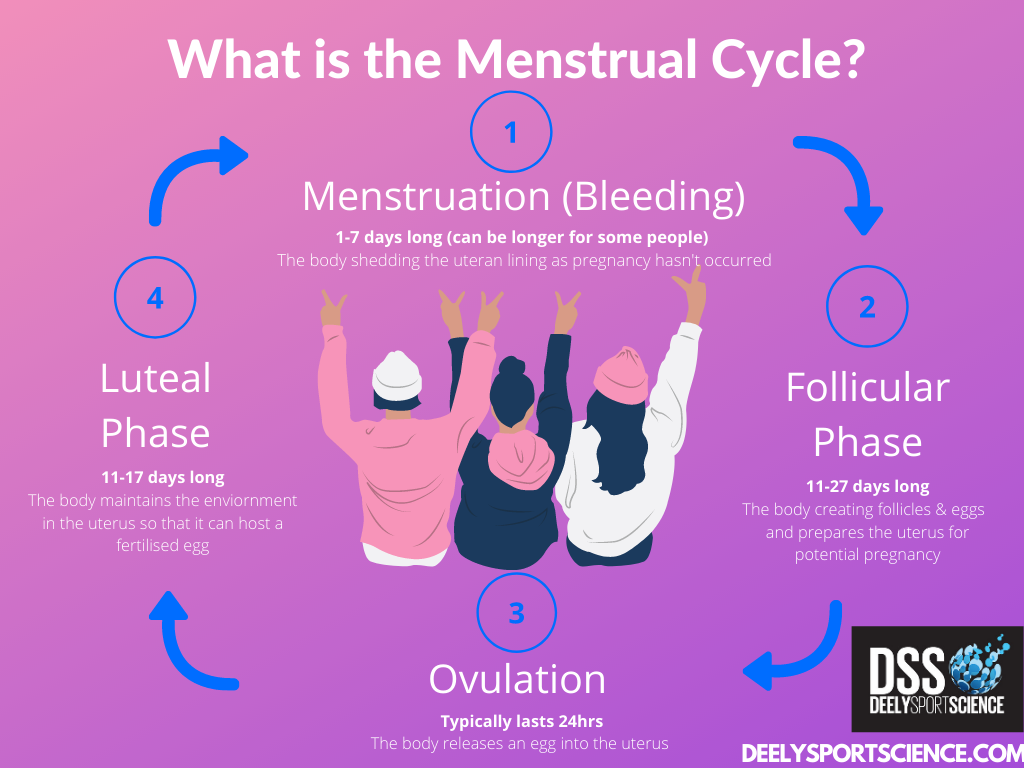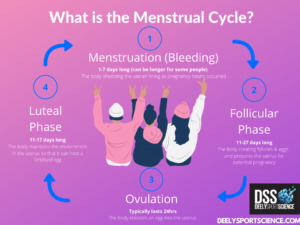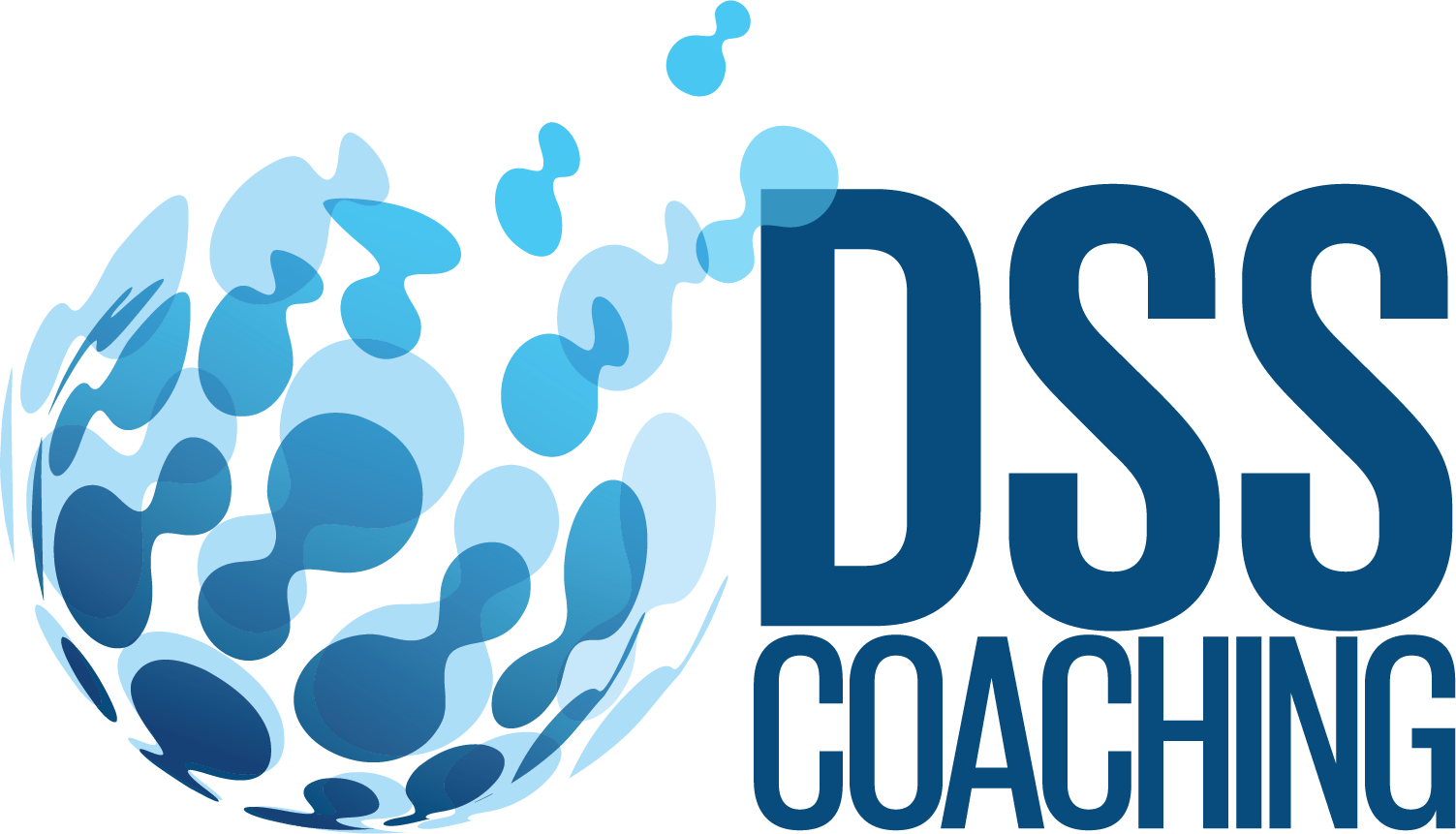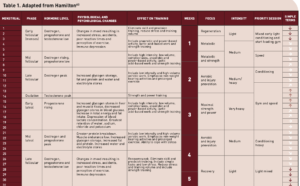
18 Mar Female Athlete Blog Series: What should coaches know about menstruation?
*Female coaches: Get 30% off DSS Elite membership for the month of March by using discount code COACH30 at checkout!*
What should coaches know about menstruation?
by Caoimhe Morris, Head of Education.
Following on from last weeks’ overview of menstruation, we’re going to dive into it in a bit more detail and outline some advice & steps that coaches can take to help their female athletes. We’ll also link some resources for you to find out more about the topic at the end of the blog
What is menstruation?
Menstruation, also called a period, is a 4-phase cycle of events around 21-35 days long that females experience, and is related to their body getting ready for potential pregnancy. Females usually get their first period between the ages of 8 and 13 (varies) and can have it up until they are 45-50 years old.
The body goes through the 4 phases to prepare for a potential pregnancy, optimise chances of pregnancy, and then if no pregnancy occurs, it will return to its normal state. This cycle lasts between 21 and 35 days (this is highly individual) and once the last phase (luteal) ends, the first phase (menstrual) starts again.

What impact does this have on females?
I’m sure everyone reading this will have experiences of female friends, family members or athletes complaining about tiredness, cramps and cravings as a result of their period, and these are all very common symptoms of the cycle! The body is releasing a lot of hormones in a short space of time, so of course the person going through those changes will feel some effects from it.
Common symptoms include, but are not limited to:
- Tiredness and fatigue
- Irritability
- Bloating
- Nausea
- Cramps (Typically around the stomach and/or pelvic area)
- Bowel issues (constipation, diarrhoea, gas, etc)
- Headaches/Migranes
- Food cravings
Common treatments for the side effects above are pain medication and rest, but again this is very individual.
So what does this all mean?
Before we dive into the sport-specific research in the area of menstruation, let’s take stock of what we’ve learned:
- There are 4 phases of the menstrual cycle (MC), which combined can last between 21-35 days
- The 4 phases are menstruation (i.e bleeding – shedding the uterine lining that was created to host pregnancy), Follicular (making eggs), Ovulation (releasing eggs) and luteal (keeping the environment hospitable to eggs)
- The MC can affect the individual in a very unique way, common issues include nausea, cramps and bloating, and these are typically treated with medication and rest.
Coaching female athletes who have recently started their period or will be getting it soon
If you coach adolescent females who have recently started their period, or are getting close to an age where they will be starting their period, it can be an interesting time! The first MC (also known as menarche) will also be accompanied by the onset of puberty (rapid maturation and growth) which can bring it’s own challenges. So what can you do as a coach?
My first piece of advice is to educate parents and guardians. Open up the conversation with them and provide them with resources on menstruation such as these. Regardless of the gender of the parent/guardian, I would always advise hosting an educational evening on it as the information they might know could be outdated or incorrect based on their own personal experience. Advise parents to then have an open conversation with their children about their MC and to let them know that they can go to you as the coach if they ever need to.
The second piece of advice is to talk to your athlete(s). Whether it’s an individual basis or a group basis, it is important that you as the coach start the conversation and open the door for future conversations if the athlete(s) ever feel the need. This can be a 2 minute overview or a 30minute educational piece, but what’s important is that you have the conversation. Some basic information that coaches should be aware of at this time is:
- Have your athlete(s) had their first period yet? If yes, at what age did it start?
- How often do they experience their period (bleeding)? This will give you an idea of how long their cycle lasts
- How are they affected by their cycle? For example, do they feel nauseous with cramps in the pre-menstruation (luteal) time? Do they feel especially fatigued at any point?
This information might seem very personal and intrusive; however it is very important. For one, it allows you as the coach to understand your players better and understand why there may be dips or increases in performance at times where there’s no obvious physiological or lifestyle change, Secondly, you are also providing the person with an important skill in tracking their period, signs and symptoms. This is extremely important for their health and well-being going forward and can often help identify some issues concerning their reproductive health early doors. I would encourage coaches to first chat to parents/guardians and provide them with more information, allow them to go talk to the athletes, and then speak to the athletes yourself as a coach.
Coaching Female athletes who have been menstruating for a while
Luckily, the advice here is very similar to the above. Athletes need to be tracking their MC and need to be aware of the effect it has on them. For some people, they will barely notice their MC. They may bleed for 3 days and then have no pain or symptoms for the remainder of their cycle. For others, they may bleed heavily for 7 days, experience extreme nausea, fatigue and headaches, and experience cramps and irritability for other parts of the cycle. A person’s experiences during the different phase of the MC are highly, highly individual, however in a general sense, there is a way to help track and control or lessen the experiences.
You may be aware that many females will be on a contraceptive medication (i.e the pill) to help ‘control’ or ‘regulate’ their periods. Unfortunately, we now understand that this is an inefficient method and masks rather than addresses the issue at hand. Research has suggested that contraceptive medication such as ‘The Pill’ can be manipulated by athletes (74% of them) to avoid the bleeding portion of their period and work their cycle to best suit their athletic calendar. The issue that coaches & scientists have with this is twofold: Firstly, the purpose of contraceptive medication is to help prevent pregnancy, and the use of it to alter the natural MC is not why it was developed. Secondly, by altering the natural MC, the athlete risks hiding some red flags that the body will try to display with regard to reproductive health. What is meant by that is that the ‘bleed’ experienced as a result of using the pill is not a true period (i.e not a bleed as a result of being in the menstruation phase of the cycle), but rather what is termed a ‘withdrawal bleed’. Females will typically become aware of an irregularity or issue with regard to their reproductive health when their MC is off (i.e their bleed is late, their cycle is longer than 45 days, etc), and so when they use the pill to manipulate their period and guarantee a withdrawal bleed each cycle, they can in fact mask the fact that their cycle is out of sync.
Again, it is important to talk to your athlete about their cycle, signs and symptoms as above. With this age group however, it is also important to have a conversation about contraceptive health, what they use (if they use them) and why. It is important that athletes understand that contraception is there to prevent pregnancy, not control their cycle.
Coaching Female athletes going through menopause or who will be going through it soon
Females will typically experience a regular MC until they are 45 to 55, by which point they will begin to experience less frequent or changing cycles, until they eventually stop. This is due to the fact that the production of eggs is slowing down to an eventual stop, and so the body no longer needs to prepare for pregnancy.
There are 2 terms that coaches should be familiar with when coaching athletes at this stage: Perimenopause and menopause.
Perimenopause is when the MC begins change. During this time, the person can experience less frequent periods, heavier periods, lighter periods etc, or a combination of those. When this initially begins (perimenopause), it is an indication that their MC will soon stop (i.e their ability to become pregnant will stop), and it can take anywhere between a few months to 12 years to fully stop (ie Menopause). Again, it is important that coaches are aware that this is happening as it can have a big influence on general health as well as athletic performance. Speaking to the athlete is vital here, and working alongside a GP or qualified professional is advised.
Once the MC has been absent for a full 12 months, this is now determined to be menopause. The athlete will now cease to experience a MC and will now be post-menopause. This can be a very difficult time for females as their body has spent the last 35+ years routinely going through this cycle, and the cessation of the production of these hormones in such quantities can have an effect on the body. Symptoms of perimenopause, apart from changing MCs, include hot flushes, mood swings (irritability), brain fog and fatigue. It is important to link in with a qualified professional to ensure that both phases are navigated safely, and that you can adapt your training appropriately.
How should I adapt my session?
For females currently experiencing menarche (their first cycle) or who have recently experienced it, it can be a challenging time. To start off, the MC can be irregular and unpredictable until the body has adapted to the new demands. This can unfortunately mean that a female can spend more or less time in each phase than expected, which can lead to them experiencing menstruation (bleeding) unexpectedly. For this reason, I would firstly advise that coaches and teams get rid or white shorts, skirts, skorts etc for these age groups.
There are some helpful and clear guidelines on the adaptation of training sessions for coaches on individual athlete bases. Implementing these changes in a team setting can be difficult, but this is the reason why we advise coaches to know and understand each individual players’ MC, so that we can plan in advance. For example, if you knew (based on your chats with the players) that in 4 weeks’ time, 6 of your squad should be in the menstrual phase, 4 in the follicular and 5 in the luteal, you can plan and adapt training to meet their needs. Here is a very useful table that outlines exactly how to adapt your training based on what phase the athletes are in
*Pitchers, G. and Elliot-Sale, K., 2019. Considerations for coaches training female athletes. Prof Strength Cond, 55, pp.19-30.
Click the image above for a link to the full paper
What should I do if my athlete doesn’t fit into the ‘average’ box when it comes to MC?
It is well documented that the MC is highly individual with regard to onset (menarche), symptoms, effects and experiences. Research into MC and its effect on athletic performance is not great, there isn’t much research done and the research that has been completed is either inconclusive or shallow in its research group. So while ‘averages’ do exist, they can be taken with a small margin of error.
However, there are some concrete facts that we know:
- Females should have experienced their first period (menarche) by 16 years old
- The MC should be between 21 and 35 days total and regular (predictable)
If you have spoken to an athlete who does not fit in one or both of these categories, should you intervene? The short answer is yes, if an athlete has not experienced their first period by 16 years old, and/or has irregular periods, there may be something preventing them experiencing a healthy MC.
We fortunately have well established research on menstrual dysfunction for females who do not experience a ‘normal period’:
- Primary Amenorrhea: The person has not experienced their first MC by 15 years of age
- Secondary Amenorrhea: The person has experienced their first MC before 15 years of age, but they have currently not experienced menstruation (bleeding) for 3 consecutive months
- Oligomenorrhea: Their MC lasts longer than 35 days in adults, or 45 days in adolescents
- Luteal Suppression: Shortened luteal phase
- Anovulation: Absence of ovulation

So, if you have had a conversation with an athlete and you feel they fit into any of the above categories, it is important to speak to their guardians and have them visit a GP or professional. Depending on who they visit, they may be advised to start on contraceptive medication to regulate their MC, however as we have learned previously, we should not rely on contraceptive medication to control our MC as this is not the purpose of it. I would generally first and foremost advise that athletes have a conversation about their nutrition and caloric intake with the professional (GP or nutritionist for example) they visit. Again, we know from well-regarded research that when females don’t take in enough calories for the amount of energy they expend, that their MC can be affected by this. Often times, by working out the correct nutritional intake, we find that the MC regulates and works for the person correctly.
*Disclaimer: Other factors can affect this, including PCOS and stress, and so it is important that you do not diagnose any conditions yourself and refer to a professional or specialist if you have concerns.
Final points and further resources:
The topic of MC can be a daunting one for coaches of both sexes, however I would absolutely encourage you to attempt to have the conversation. It may be messy and you may feel uncomfortable or out of your depth, but by opening the door for the athlete to speak to you about the topic in the future, you will at the very least start them thinking about their MC and make them feel like it is a topic they can discuss with you, no matter how awkward it might be! Just know that you do not need to know everything or have all the answers, but by giving the athlete the knowledge that they can speak with you if they are feeling the effects of cramps and are unable to train to the full plan, and that you’ll understand it, can make a big difference.
Some further resources based on your knowledge level:
New to the topic:
https://kidshealth.org/en/parents/talk-about-menstruation.html
https://elite.deelysportscience.com/wp-content/uploads/2021/03/periods-what-you-need-to-know.pdf
https://www.instagram.com/periodoftheperiod/?hl=en
I know a bit:
https://www.ais.gov.au/__data/assets/pdf_file/0012/979464/FPHI-Menstrual-Cycle.pdf
https://open.spotify.com/episode/2nLt3Vzx9clW9DhNsNQ5Cf?si=broRWFlpRr-oX-wtxnVF8g
https://open.spotify.com/episode/633249uhH8CS5hS5xaIUgL?si=9C9ReIlMRquXPyykeaAcww
I know a fair amount:
https://open.spotify.com/show/1fMn7drvFsRbN3v07v2Gdm?si=jAt37sAqSSuX4cXXyL5JTw
https://ussoccer.box.com/shared/static/3f1wr9zxuo2fcd56myz1bdcajb10yab9.mp4
https://open.spotify.com/show/5FSSrIZu3YbmkP7wXxHrbm?si=ZcgdDGk2RQiMwwVmzv_Yng
Our next blog, “What should coaches know about nutrition for female athletes’ from John Murphy, will be released on Thursday 25th of March and will conclude our female athlete blog series.
As always, feel free to ask any questions below or shoot me a message, more than happy to assist!
Caoimhe Morris
BA, MSc
Head of Education, DSS
Twitter: @CoachCaoimhe
Instagram: @coach_caoimhe




No Comments